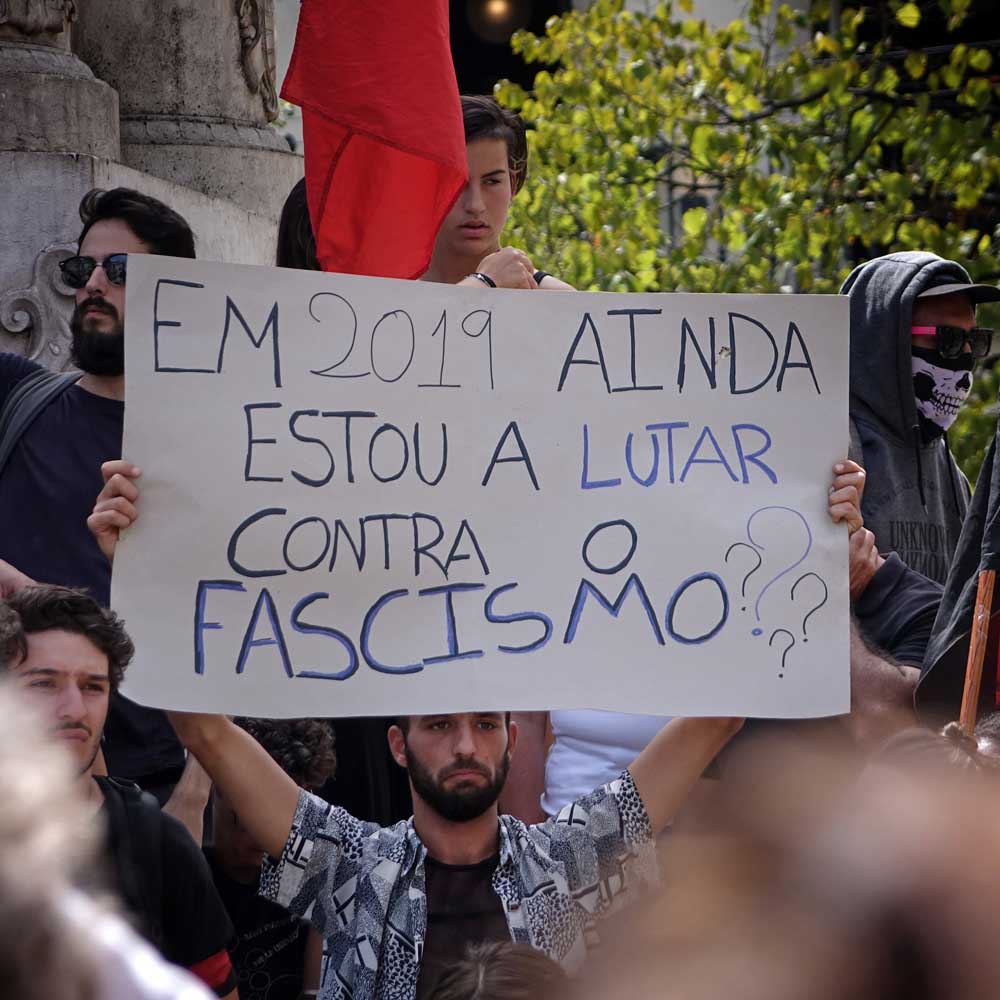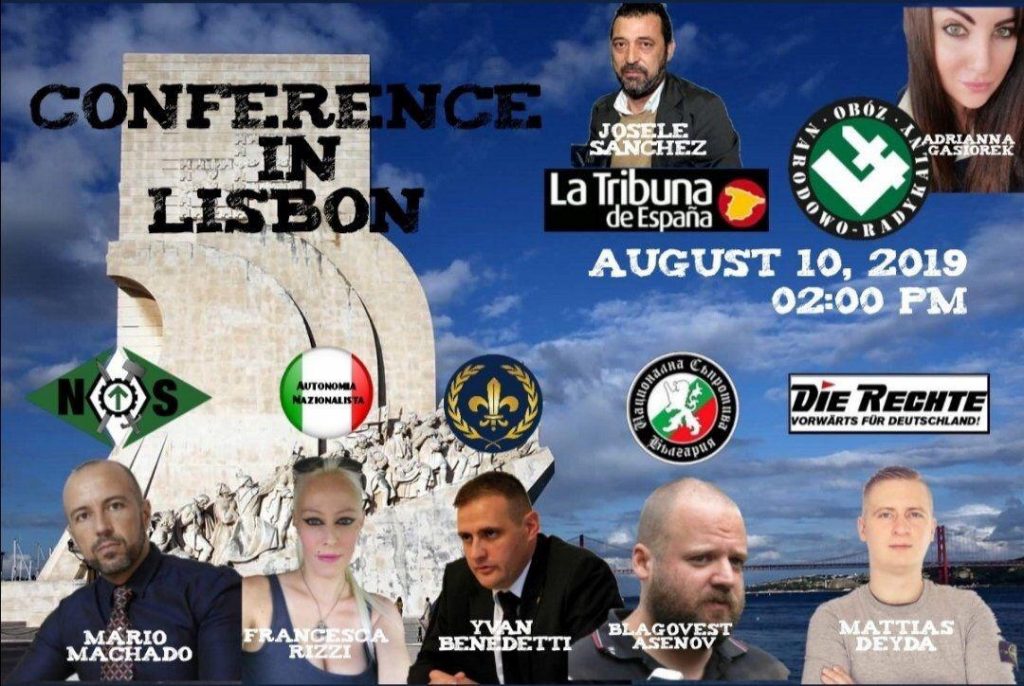Portugal // Normalization and resistance to far-right discourse~ 9 min

By Duarte Guerreiro and Simone Vieira
By mid July, the ideologically fascist proto-party New Social Order (Nova Ordem Social or NOS, which also spells “Us” in Portuguese) lead by Mário Machado, announced a European far-right conference in Lisbon.

Despite the fact that the meeting location was initially unknown, an antifascist demonstration was still called for the same day in Lisbon by the Antifascist United Front (Frente Unitária Antifascista or FUA). A similar answer to the one given by the Lisbon Antifascist Platform (Plataforma Antifascista de Lisboa or PAFL) when NOS called a public event this past February.
Gathering allies
FUA’s ability to publicize its demonstration and the antifascist struggle was commendable, if we take into account that these events usually tend to be self-contained to the more street level left, always suspicious of broader participation. Jonathan Ferreira da Costa, coordinator for FUA and the Braga Antifascist Nucleus (Núcleo Antifascista de Braga or NAB):
(…) we invited every organization which we thought might relate, in some way, with this struggle. We became aware that the petition was having some effect on some organizations who usually don’t pay attention to us when we saw the first articles coming out and they had the names of party representatives on them.
As the petition’s objective was to obtain a parliamentary answer, we confess that we didn’t think that it would force parties, for example, to mobilize for this action, but just to take public positions and follow the expected procedure when petitions reach a sufficient number of signatures.
It was a good surprise, even if we are keeping vigilant to the possibility that it is only an attempt to gain visibility for the next elections. For our next events, one of which is a national meeting of the United Antifascist Front, we are going to invite the organizations present [at the demonstration], a first step to understand if there really was an increase in awareness or if it was only political calculation.
Through media pressure and by demonstrating the existence of a vast body of organizations interested in the event, some favorable stances were wrenched out of the parliamentary left parties, which usually prefer to avoid street events beyond their control.
Such was the case with the Left Bloc of “turn your backs on them and they will leave” fame (the wise advice given some of their members during another antifascist event) which publicly declared that this time they would be present. The Portuguese Communist Party, despite a condemnation of the conference, chose not to participate in the counter-protest, remaining faithful to its history of only participating in events controlled by its apparatus. Jonathan added:
The sectors which gave us the most support were the non-parliamentary parties like MAS [Movimento Alternativa Socialista or Socialist Alternative Movement], which in fact is the only party that has supported the movement from the beginning, helping it build itself and participating in each organization, while respecting our autonomy and independence.
We’ve also received strong support from the LGBT community, from sectors connected to the housing struggle, and revolutionary sectors, both anarchist or communist.
But what surprised us the most was the international support we obtained (…), among them two Brazilian parties which were also present at the mobilization.
(…) We believe that this mobilization, the strongest in recent years of antifascist struggle, is proof that our movement is doing its work correctly and has been able to overcome the prejudice that previously stuck to it.
Consequently, despite the sunny August day inviting a certain “sign the petition and head to the beach” kind of activism, the demonstration had a respectable participation, as our video shows.
The Socialist Party and the State apparatus preferred to turn a blind eye, as usual, once again ignoring the dead letter of the Constitution of the Portuguese Republic.
Article 46.º (Freedom of association)
(…) 4. Armed or military type associations, militarized or paramilitary, are not consented, nor racist organizations or those who advocate fascist ideology.
Meanwhile, at the Altis Sana hotel
NOS encountered difficulties on the 9th, a day before the conference. Mário Machado published the following communication from the Altis Belém hotel, where the conference was supposedly going to happen:
The Altis group administration learned that the meeting scheduled for tomorrow is of a political nature and in support of the far-right, which might compromise the tranquility of our guests and even their security. Therefore, we are sorry to inform that we will consider said meeting cancelled.
Machado blamed the “Marxist-Stalinist” government and State. But he soon found an alternative at a Sana hotel. The conference did not fill up the room, with several estimates pointing to around 60 to 70 participants. The usual swastikas and skulls contingent was present.

Ephemera made some records of the conference, for those in the market for some self-flagellation. You can listen to Mário Machado quoting SS and Romanian Iron Guard officers and denouncig the National Renovation Party (Partido de Renovação Nacional or PNR, another far-right party) for having “many Africans, Asians”.
Institutional fascism
With a shaved head, sporting swastika tattoos, condemned for violent crimes, his discourse taken straight out of the worst aspects of the Second World War and associated with neonazi gangs responsible for murders, Mário Machado is a figure that easily lends itself to a caricature of the far-right, thus becoming its symbol in Portugal.
However, the new ascendant far-right in groups like the Identitarian Shield (Escudo Identitário) sees in him precisely the image of all it wants to abolish in order to build a new nationalist image founded on internationally proven concepts. Race is replaced by identity, national biological determinism supplanted by ethnic cultural determinism.
Jewish-masonic conspiracies are replaced by cultural Marxism, the vast conspiracy uniting academia and the media to promote the struggles of feminists, LGBT’s, immigrants, etc. to be used as a fifth column to weaken the precious bodily fluids of the nation-state and lead to its final destruction by communist perversion.
So far, nothing new, different paths to the same destination. The danger that the antifascist movement must pay close attention to and which we have witnessed multiple times abroad, recently right next door in Spain, is that as soon as some of these ideas start obtaining any kind of traction, they are incorporated by the dominant right-wing parties.
Such was the case with Vox which, far from being a new force, was instead a distillation of the more openly fascist elements of the Popular Party into a single force capable of capturing the votes of those radicalizing to the right, while both parties continue to closely cooperate to advance their designs on the State apparatus.
Recently, in Portugal, we have seen how CDS-PP (Christian Democrats) and PSD (Social Democratic Party) united to give voice in Parliament to the struggle against “gender ideology”. Much has been left unsaid about the matter of gender identity, but it is doubtful that such was the main concern of our dear parliamentarians. It’s more likely that they saw how the right-wing social network discourse against a nebulous “gender ideology”, promoted by the fearsome Frankfurtian Marxists of the Left Bloc, was gathering a lot of likes, thus coming to the conclusion that it might be a good idea to mount that donkey.
If the excellencies at the right-wing parties had been genuinely concerned about ideology being introduced into schools, they should have galvanized a long time ago against the Moral and Religious Education discipline – a thin cover to force Catholicism into supposedly secular State schools. What this discourse obviously promotes is something more akin to the “Schools without Parties” campaign of the Brazilian right-wing – the reinforcement of the most reactionary dominant ideology by removing all counter-narrative spaces.
On the topic of Brazil, in the same way that the non-NOS far-right excludes Mário Machado from the roll of “true” representatives of the far-right, a curiously similar phenomenon of ignoring Machado could be observed at the antifascist demonstration. His ideals were certainly repudiated, but the names on everyone’s lips were Bolsonaro (by far), Salvini, Trump, Vox.
It was perhaps an unconscious recognition of the day’s performativity, and that the real enemy was not on the streets but entering worldwide State cabinets.
And if we want to be true to our antifascist intentions, we can never forget that. Street antifascism can buy time. But how we use that time is what will make the difference. We are sitting atop a corpse called social-democracy, which when sufficiently rotted by the crises of capitalism will always turn into the food for the fascist maggot.
Time for what? In Greece, street antifascism won time for social-democracy to finish applying the “left austerity” of Syriza, allowing for the return of the status quo. All the nazi punching in the USA didn’t stop Trump’s election, nor does it now stop his indifferent cruelty. The Italian street antifascism movement didn’t stop Salvini in his intention of using the Mediterranean as a trench for African corpses.
If we really want the definitive end of fascism, we must aim higher, dig up the corpse of social-democracy, burn it and launch the foundations of something new. Until then, we will only be playing for extra time. Let us use it to organize ourselves.




